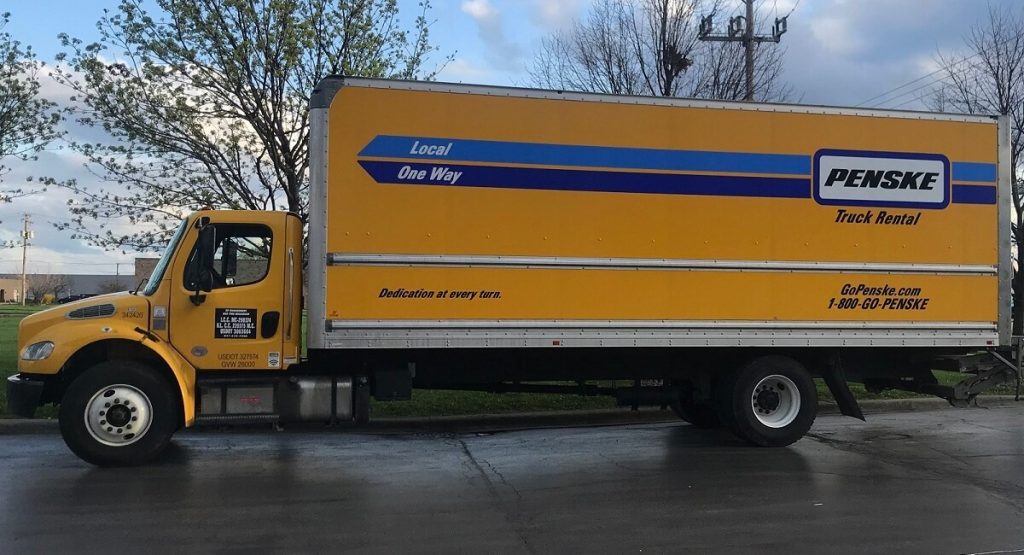what kind of trucks have to stop at weigh stations
Does My Moving Truck Demand To Stop At A Weigh Station
If you're planning to hire a moving truck and drive it across the country (or at least through multiple states), y'all should be aware of each state'south highway regulations weight station requirements so you tin be sure to avoid fines.
Whether you'll need to stop or not really depends on where you're going. Highway regulations vary from land to state. Failure to stop at weigh stations can result in fines, even if your truck is empty.
Go on reading to decide whether or not you'll demand to stop at a weigh station during your move. And if you lot're withal not certain, information technology'south ever all-time to stop and let a highway official make the last call.

Rental trucks are a popular choice for most DIY movers, and accept varying weights and sizes. The boilerplate 10-foot truck weighs effectually 8,600 pounds, while the largest, 26-foot trucks, weigh near 26,000 pounds.
What is a counterbalance station and what are they for?
A weigh station is a highway checkpoint where highway officials tin verify the weight of a truck or commercial vehicle. Typically the state'due south Department of Transportation works in conjunction with highway patrol to brand sure vehicles are in accordance with state laws and safety regulations.
Weigh stations support your condom and the protection of our roadways by ensuring that overweight vehicles are not damaging roadways or putting other motorists at risk.
Some states collect taxes based on the weight of the appurtenances being transported. For this reason, weigh station requirements vary past land.
How do counterbalance stations work?
Weigh stations involve heavy-duty scales that measure a truck'south weight based on either axle weight or the weight of the whole vehicle. Some take rolling (or automated) scales that allow the truck to go along moving, and others crave a complete terminate.
Outside of ensuring that the vehicle is not overweight, a weigh station official can besides administrate a rubber inspection to ensure the truck is working properly—however, this is usually washed randomly, or if the official has reason to believe the truck is dangerous.
So, which vehicles need to finish?
By and large, any commercial vehicle that exceeds a GVW (gross vehicle weight) of 10,000 pounds needs to stop at a weigh station. For reference, the average GVW for a 10-human foot truck rental is around 8,600 pounds, while a 26-foot truck volition be around 26,000 pounds. Additionally, most rented trucks volition have weigh station requirements printed on the vehicle.
If you desire to know how trucks vary from company to company, like Penske to U-Booty , for example, exist sure to compare each visitor'southward truck sizing, weight, and other of import specifications.
However, to be completely sure, you'll desire to double-cheque the regulations in the states you'll be passing through. Some states have regulations if the GVW exceeds a certain weight while others have none:
Weigh station requirements by country:
| State | Weigh station requirements |
|---|---|
| Alabama | Not required |
| Alaska | Required if GVW exceeds x,000 lb. |
| Arizona | Required if GVW exceeds 10,000 lb. |
| Arkansas | Required if GVW exceeds x,000 lb. |
| California | Required for all moving trucks |
| Colorado | Required if GVW exceeds 26,000 lb. |
| Connecticut | Non required |
| Delaware | Not required |
| Florida | Trucks containing agricultural products must finish at an Agricultural Inspection Station |
| Georgia | Required if GVW exceeds 10,000 lb. |
| Hawaii | Required if GVW exceeds x,000 lb. |
| Idaho | Not required |
| Illinois | Not required |
| Indiana | Required if GVW exceeds 10,000 lb. |
| Iowa | Required if GVW exceeds 10,000 lb. |
| Kansas | Required for all vehicles with a truck registration |
| Kentucky | Non required |
| Louisiana | Not required |
| Maine | Non required |
| Maryland | Not required |
| Massachusetts | Non required |
| Michigan | Not required |
| Minnesota | Required if GVW exceeds 10,000 lb. |
| Mississippi | Non required |
| Missouri | Not required |
| Montana | Required if GVW exceeds 8,000 lb. or if conveying agricultural materials |
| Nebraska | Required if the GVW exceeds 2,000 lb. |
| Nevada | Not required |
| New Hampshire | Not required |
| New Jersey | Required if GVW exceeds x,001 lb. |
| New Mexico | Required if GVW exceeds 26,001 lb. |
| New York | Not required |
| North Carolina | Not required |
| Northward Dakota | Required if GVW exceeds 10,000 lb. |
| Ohio | Required if GVW exceeds 10,000 lb. |
| Oklahoma | Not required |
| Oregon | Required if GVW exceeds 26,000 lb. |
| Pennsylvania | Required for all vehicles and all weights |
| Rhode Island | Not required |
| Due south Carolina | Non required unless vehicle's weight appears unlawful |
| South Dakota | Required if GVW exceeds eight,000 lb. |
| Tennessee | Not required |
| Texas | Not required |
| Utah | Not required |
| Vermont | Not required |
| Virginia | Required if GVW exceeds 7,500 lb. |
| Washington | Not required |
| West Virginia | Not required |
| Wisconsin | Required if GVW exceeds 10,000 lb. |
| Wyoming | Chosen at random for inspection |
What happens if y'all don't finish?
A driver is only allowed to legally bypass a counterbalance station if at that place is a sign stating it is okay to continue. Otherwise, if the driver continues without stopping at a weigh station, a roadside camera may take a picture of their vehicle and highway officials could post a fine of up to $300. That's why it's important to recall to finish at counterbalance stations when required, even if your truck is empty!
Remember:
- The entire weighing procedure usually takes less than 30 minutes.
- Weigh stations will usually have signs indicating whether the counterbalance station is open and who is required to stop.
- It doesn't cost annihilation to stop and have your truck weighed, unless your truck exceeds the legal weight.
Bottom line
Renting a moving truck for a long-distance motion is a pop, cost-efficient way to get your property from your quondam abode to your new one. Simply if you're driving the truck yourself, you'll want to remember to consider the highway regulations in your country.
Weigh stations can be a pain to bargain with, but they play a huge role in reducing damage to roadways and supporting highway safety. If you lot're not sure whether you need to stop, it's best to pull into a weigh station and permit the officials handle it. Skillful luck, mover!
Back To Acme
Source: https://www.move.org/truck-stop-weigh-station/

Publicar un comentario for "what kind of trucks have to stop at weigh stations"